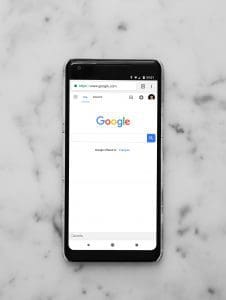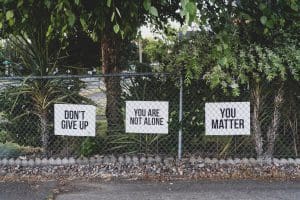
Stepping Back
February 10, 2021 in Educate Yourself
 I wanted to talk about something that I recently realized other people with mental health issues also experienced. Personally, I know that I always sign up for way too many commitments and responsibilities that, realistically, I can’t follow through on or complete to the best of my abilities due to a lack of time.
I wanted to talk about something that I recently realized other people with mental health issues also experienced. Personally, I know that I always sign up for way too many commitments and responsibilities that, realistically, I can’t follow through on or complete to the best of my abilities due to a lack of time.
This can look like a lot of different things: joining student organizations/clubs, running for leadership positions in those clubs, working part-time during school, or even taking multiple hard classes at once on top of all the prior commitments. I’m not saying that you shouldn’t do this, because the highly competitive nature of college and the job market make these expected of students nowadays. Also, that would make me a hypocrite because I’m the poster child of overloading myself just for the extra line of my resume. I did the same thing in high school, working 2 part-time jobs and 4 extracurriculars, which kept me busy every day from 7:30 AM to around 11:30 PM. But, it wasn’t until recently that I realized there might be another reason I was doing this.
I was putting myself in a position where my responsibilities constantly demanded my attention the entire time I was awake to avoid thinking about, confronting, and even acknowledging the suffering that was going on in my head. Admittedly, I saw someone mention this in a TikTok, but the message was very true, regardless of where it came from. It made perfect sense to me. In high school, I put on a fake smile to get through the day with a little resistance as possible. Then, working retail the second I got out of school forced me to use my “customer service voice/attitude”, where you don’t have the ability to be negative or unhappy because that would make the customer uncomfortable; you had to be constantly cheery and helpful no matter how miserable you were in your “real life” outside that job.
 My college career has been no different, I chose a hard major and added countless clubs, committees, leadership positions, internships, TA roles, etc. to keep myself busy. Because, if I’m too busy to process and feel my emotions, then they aren’t really there, right? Wrong. They are very much there, and the second you get actual free time to yourself, all those repressed emotions come bursting out. It’s the emotional equivalent of shaking up a soda can for months on end and then finally deciding to open it one day when you catch a break.
My college career has been no different, I chose a hard major and added countless clubs, committees, leadership positions, internships, TA roles, etc. to keep myself busy. Because, if I’m too busy to process and feel my emotions, then they aren’t really there, right? Wrong. They are very much there, and the second you get actual free time to yourself, all those repressed emotions come bursting out. It’s the emotional equivalent of shaking up a soda can for months on end and then finally deciding to open it one day when you catch a break.
This is exactly what happened to me over the past winter break. I had leisure time for the first time in months and opened that soda can just for it to blow up in my face. Going from working 70+ hours per week between school, my internship, and my leadership responsibilities to having zero commitments overnight was a tough adjustment. I had too much time on my hands and nothing to distract from the thoughts I was so desperately avoiding. I had a really tough bout of depression that I had to face head-on and went from being a “high-functioning” depressed person to a shell of the person I used to be. I couldn’t get myself out of bed before 2-3 PM, the thought of sending a single email made my stomach churn, my personal hygiene went out the window, etc. This is actually the reason why I have not made any contributions here during December; I was purposely emotionally stunting myself so I could not come up with anything to talk about. But once break started, I was too depressed to complete even the bare minimum requirements.
 For this reason, I had to step back and “unplug” from everything. I stopped watching my inbox as emails continued to flood in, I spent as little time as possible on my computer (after spending an entire semester glued to screens due to remote school and work), and I started reading again. I used to be very passionate about reading when I was younger but didn’t have time to continue once I started piling all these responsibilities on. I knew that the upcoming Spring semester was going to be the same as the Fall, so I did everything in my power to avoid doing anything that was similar to it. I forced myself to embrace what I was feeling, with minimal distractions, and try to just “reset.”
For this reason, I had to step back and “unplug” from everything. I stopped watching my inbox as emails continued to flood in, I spent as little time as possible on my computer (after spending an entire semester glued to screens due to remote school and work), and I started reading again. I used to be very passionate about reading when I was younger but didn’t have time to continue once I started piling all these responsibilities on. I knew that the upcoming Spring semester was going to be the same as the Fall, so I did everything in my power to avoid doing anything that was similar to it. I forced myself to embrace what I was feeling, with minimal distractions, and try to just “reset.”
Stepping back and facing my emotions for around 6 weeks helped me learn more about myself and why I was feeling the way I was. It also helped me learn what I wanted to do differently for the next semester to be healthier, both mentally and physically. As of writing this, I’m two weeks into the Spring semester and have adopted some of those healthy habits I planned. I have even more on my plate than I did in the Fall, but being able to take a break from life and process my emotions has made this semester seem more manageable than I would have thought.
Do you consider yourself to be a busy person? Is there a reason you keep yourself busy? How do you feel when you do find yourself with downtime? What thoughts do you have?





Recent Comments